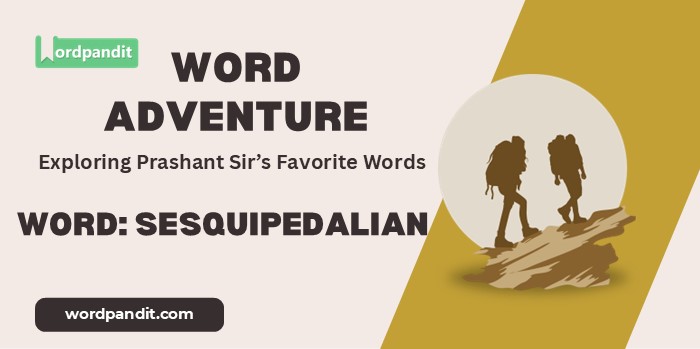Word Adventure: Sesquipedalian
The Headline
“Sesquipedalian: The Love Affair with Long Words Gets Its Own Long Word”
The Scoop
In the grand lexicon of English vocabulary, some words seem to embody their own meaning. ‘Sesquipedalian’ is precisely such a word – a long term that literally means “given to using long words.” Join me as we unravel this multilayered marvel that celebrates the joy of linguistic complexity.
Let’s Break It Down
The Plot Thickens
The story of ‘sesquipedalian’ takes us back to ancient Rome, where Latin writers used “sesquipedalia verba” (literally “foot-and-a-half-long words”) to describe unnecessarily long words. The term was famously used by the Roman poet Horace in his “Ars Poetica” as a gentle criticism of overly elaborate language.
Over time, the word evolved from describing merely the length of words to encompassing a style of communication that favors complex, multisyllabic vocabulary. It can be used both as an adjective to describe such language and as a noun to refer to someone who regularly employs such words.
Interestingly, the word has maintained its somewhat playful and self-aware nature throughout its history – after all, using a long word to describe the use of long words shows a certain linguistic wit!
Word in the Wild
The Twist
Here’s a delightful paradox: while ‘sesquipedalian’ describes the use of unnecessarily long words, it’s actually quite useful and precise in its meaning. There’s really no shorter way to say “characterized by using long words” that captures the same nuance. This makes it one of those rare cases where using a long word is actually more efficient than using several shorter ones – a fact that would surely amuse the ancient Romans who coined the term as a criticism of verbose language!
Make It Stick
Sesquipedalian: When your vocabulary’s so tall, it needs a step-ladder!
Your Turn
Think about your own relationship with complex vocabulary. Are you a closet sesquipedalian, or do you prefer simpler language? Share your favorite “big words” in the comments below, and tell us why you love (or avoid) using them. Let’s celebrate the diversity of expression in our linguistic toolbox!
Down the Rabbit Hole
- Curious about other self-referential words? Explore ‘autological’, ‘polysyllabic’, and ‘heterological’.
- Interested in the history of verbose language? Look into ‘euphuism’, ‘grandiloquence’, and ‘purple prose’.
- Want to discover more Latin-derived word length terms? Research ‘brevilocuent’, ‘longiloquence’, and ‘multiloquent’.
The Last Word
As we conclude our exploration of ‘sesquipedalian’, I hope you’ve gained an appreciation for this wonderfully self-aware word that celebrates the complexity of language itself. Whether you’re a devoted sesquipedalian or prefer more concise expression, remember that every word in our vast vocabulary has its place and purpose. Until our next word adventure, this is Prashant from Wordpandit, encouraging you to embrace both the simple and the sophisticated in your linguistic journey!














